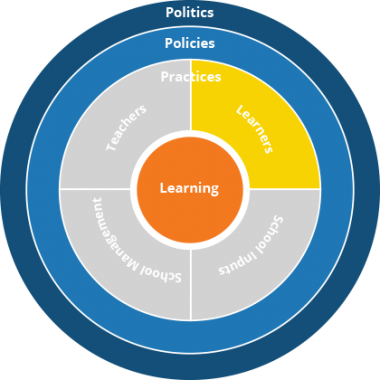Learners
It is essential to put learning for all children at the center, as we have now committed to do with the SDGs. But learning itself is not actionable. To improve learning, we must consider all the school- and student-level ingredients that make learning possible. We think of these as the “service delivery” or “practice” indicators. Learning depends on having students arrive at schools prepared and ready to learn. That is, they are healthy and well-nourished children who have benefited from stimulation in early childhood. For this, we measure students’ readiness for learning as well as student presence.
Practices

Learners - Policies
But we can’t stop at practices, we need to go beyond the school-level factors to think about the broader system that influences what students do. Students are not acting in a vacuum. They are responding to the signals and incentives set by the system as a whole. For this, we look at the policies that influence how ready for learning students are by the time they get to school. Children need quality environmental inputs to grow healthy. These include essential physical inputs (such as quality pre- and postnatal nutrition, health care, and safe physical environments) as well as social inputs (such as nurturing, protection, and stimulation). Of equal importance are the interactions between caregivers and their children in the early years. These interactions, either at home or at a center-based facility, leave a significant imprint, literally shaping the developing brain. To account for these needs, there are five broad policy levers: nutrition programs, health programs, early childhood education, and the building of caregiver’s financial and skills capacity.
Learners - Politics
Finally, there is the political and bureaucratic environment in which these policies are created and implemented. Key areas include financing, characteristics of bureaucracy, impartial decision-making, mandates and accountability, and the existence or not of time-bound, concrete national learning goals.
Politics
Policies
Practices

